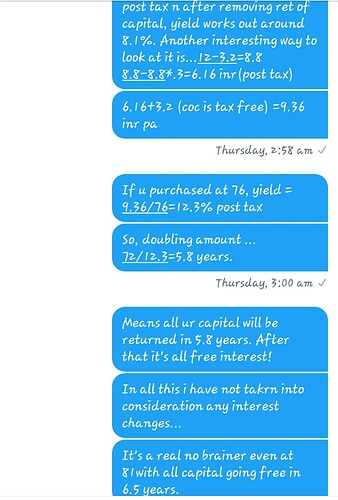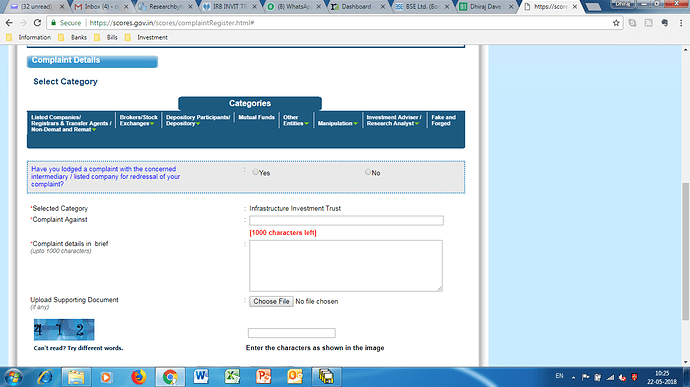IRB Infrastructure Investment Trust (IRB InvIT) is entering the primary market on Wednesday 3rd May 2017, to raise Rs. 4,300 crore via a fresh issue of units and an offer for sale (OFS) of upto 3.48 crore units, in the price band of Rs. 100 to Rs. 102 per unit, with a 25% greenshoe option. Since minimum issue size is 10,000 units (i.e. Rs. 10 lakh at lower end) issue is clearly not for retail investors (which have Rs. 2 lakh threshold for IPO of equity shares). Post listing too, lot size has been kept large at 5,000 units (i.e. Rs. 5 lakh at lower end) to discourage retail participation. Minimum 25% of the Rs. 5,030 crore issue (including greeshoe portion) is reserved non-institutional investors (read HNIs), with balance 75% for institutions. To be listed on NSE and BSE, issue closes on Friday 5th May 2017.
IRB InvIT is a Special Purpose Vehicle (SPV) or a bundle of IRB Infrastructure Developer’s 6 operational toll-collecting road projects covering 3,645 lane kms of highways in Maharashtra, Gujarat, Rajasthan, Karnataka and Tamil Nadu, with average balance concession period of 16 years. As per regulations, it is required to distribute 90% of distributable cash to unit-holders in form of dividends, which is tax free (in the hands of the trust and unit-holders), at a frequency of 6 months.
This is the maiden IPO of any investment trust in India, the financial product not being a debt nor pure play equity, since it lacks a fixed rate of interest and assurance of principal repayment like debt, while risk borne is higher (inflation, toll collection, interest rate etc.) similar to equity. Thus, it is quasi-debt mixed with some equity risk. Based on holding period for computing capital gains, it tilts more towards debt, since, to qualify as a long term asset, holding period is a minimum of 3 years, unlike listed equity shares, enjoying a shorter 1 year holding window, despite both being subject to securities transaction tax (STT). This step-treatment for tax purposes may not go down too well with prospective HNIs.
While sole income stream of toll collection garnered Rs. 987 crore in combined revenue for these 6 projects, it reported negative PAT of Rs. 76 crore for FY16, on account of massive interest outgo of Rs. 435 crore. While loss after tax contracted to Rs. 13 crore for 9MFY17, interest burden remains high at Rs. 310 crore. Fresh issue proceeds will retire debt worth Rs. 3,350 crore (of the total Rs. 4,745 crore as of 30-4-17), while about Rs. 1,680 crore will flow to the sponsor IRB Infrastructure Developer, which will aid the latter’s balance sheet. Lower interest burden should turnaround the operations in the first year itself, enabling timely dividend payments. At Rs. 102 per unit, the Enterprise value of the SPV is pegged at Rs. 5,922 crore. Estimated yield on the product is about 10-12% pa post tax, which is however, not guaranteed, while scope for capital appreciation is negligible, unless issue is grossly over-subscribed.
It is important to note: While India Ratings has assigned AAA credit rating for the underlying assets, it has not rated the units being offering in the current IPO. Likewise, CARE’s AAA rating is again not assigned to the units being offered currently, but on the presumption that the total debt of the trust will not exceed Rs. 1,000 crore, post completion of the IPO. Thus, it would be wrong to assume ‘AAA’, the highest credit rating, for this IPO.
Success of this new product is yet to be proven as both regulations are untested so is their suitability for India. Take for example, Standard Chartered PLC, which came with an IPO of Indian Depository Receipts (IDR) in May 2010, had drawn a lot of investor and media attention, but could not capitalise on its first-mover advantage. The IDR, having issued at Rs. 104 a piece are now ruling at Rs. 53 per share, nearly half of its 7 year old IPO price. Thus, new products may not always find favour. Only time will tell!
Given the ongoing bull run in Indian equities, IRB InvIT is suited only as a diversification option for ultra HNIs, with liquidity needs, after understanding the novel financial instrument well. Since it is quasi debt, mixed with some equity risk, it scores over pure debt instruments, while obviously trailing equity.
VALUATION REPORT IRB INVT.xlsx (22.8 KB)


